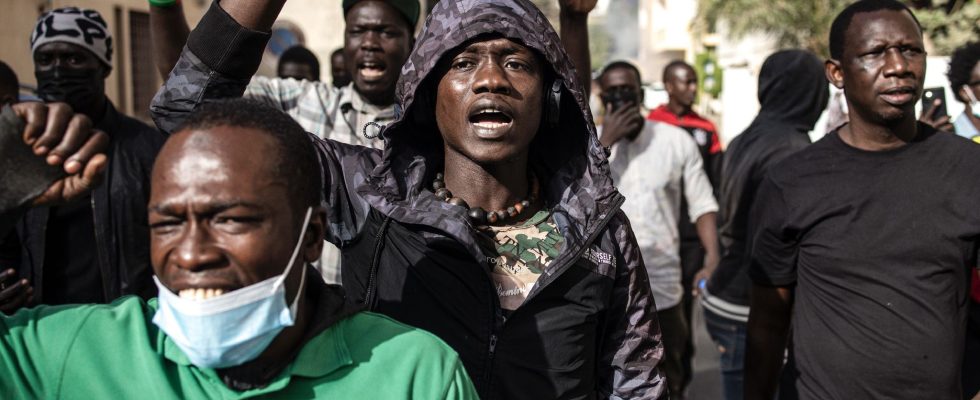“The presidential election is still being held on the due date.” This maxim, well known to the Senegalese, which, in 64 years, has never been contradicted, at least until this Saturday, February 3. President Macky Sall has decided to postpone the presidential election, initially scheduled for February 25, indefinitely. “I will initiate an open national dialogue, in order to create the conditions for a free, transparent and inclusive election,” he indicated in a televised speech lasting a few minutes.
The announcement ignited the powder. The next day, hundreds of demonstrators took to the streets to protest, and clashes broke out in the Senegalese capital. Flags in hand, some 200 people converged on a roundabout, before blocking traffic by erecting a barricade using burning tires. This Monday morning, our AFP colleagues noted that mobile Internet data had been cut in Dakar. The maneuver echoes the events of June 2023, when the government temporarily suspended access to the Internet.
However, this did not prevent the deputies from meeting at the end of the morning. Under the cries of demonstrators, who chanted “Macky Sall dictator” in front of Parliament, elected officials examined a bill providing for the postponement of the presidential election. Adopted in committee on Sunday, the text which relies on a six-month postponement must be approved by three-fifths of the 165 elected officials, or 99 deputies. Far from being won: the detractors of the head of state do not hesitate to speak of a “constitutional coup d’état”.
Postponement due to institutional crisis
It must be said that the decision came just a few hours before the official opening of the electoral campaign. “In a fraction of a second, the whole process stopped,” Babacar Ndiaye, political scientist and director of research and publication of the Wathi think tank, based in Dakar, tells L’Express. A turnaround that Macky Sall justifies by the institutional crisis born from the standoff between the Constitutional Council and the Senegalese Parliament.
The soap opera begins at the end of January when the supreme court, while validating twenty candidacies, rejects those of the anti-system opponent Ousmane Sonko, in prison since July 2023, and Karim Wade. The latter, son of ex-president Abdoulaye Wade, was rejected for his dual Franco-Senegalese nationality which contravenes the constitutional principle according to which “any candidate for the presidency of the Republic must be exclusively of Senegalese nationality”.
A commission of inquiry voted by the majority
While insisting that he “renounced his French nationality for a long time”, Karim Wade denounces a “blatant attack on democracy”. Under his leadership, and that of his PDS party, the deputies approved the opening of a commission of inquiry into the conditions of validation of candidacies. Several elected officials from the majority were involved, which did not fail to fuel suspicions of a government plan to postpone the presidential election and avoid a defeat. What upcoming schedule? Only one thing is certain: the mandate of Macky Sall, who has already announced not to seek a third candidacy, officially ends on April 2, 2024.
In this country of 18 million inhabitants, long designated as the island of stability in West Africa shaken by numerous coups d’état in Mali and Burkina Faso, this political crisis has the effect of a real earthquake. The cancellation of the vote “is a dangerous precedent, warns Babacar Ndiaye. Senegal has always been seen as a democratic model in a region where many instabilities remain […] Today, Macky Sall put an end to it.”
Authoritarian excesses
Same story with Felwine Sarr who denounces the authoritarian excesses of the executive in place. “After dissolving the main opposition party, imprisoning its leaders, imprisoning more than a thousand citizens who expressed their opinions, desecrating our institutions, the President of the Republic […] takes a decree to cancel/postpone the presidential election”, protests the Senegalese writer and academic in a column taken up by International mail.
On Sunday evening, former Prime Minister Aminata Touré, fiercely opposed to the postponement, was notably arrested during one of the rallies, opposition MP Guy Marius Sagna told AFP. A few hours earlier, one of the presidential candidates, Daouda Ndiaye, who reports having been “brutalized” by the police, also assures that some of his collaborators have been “arrested”.
Outside Senegalese borders, the situation is worrying. The Community of West African States (ECOWAS), the African Union, the United States, the European Union, and France have all called for dialogue between the different actors in the crisis.
